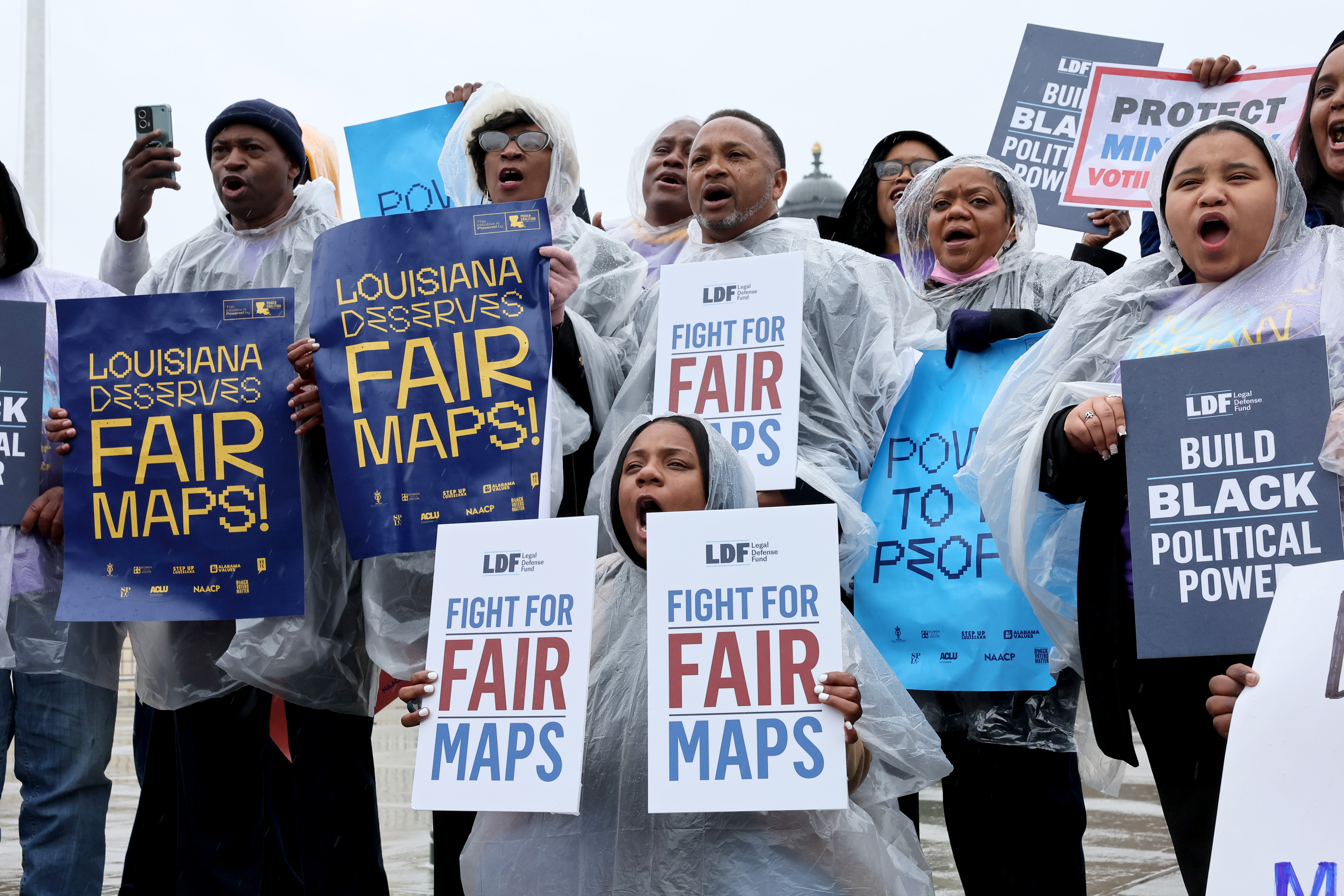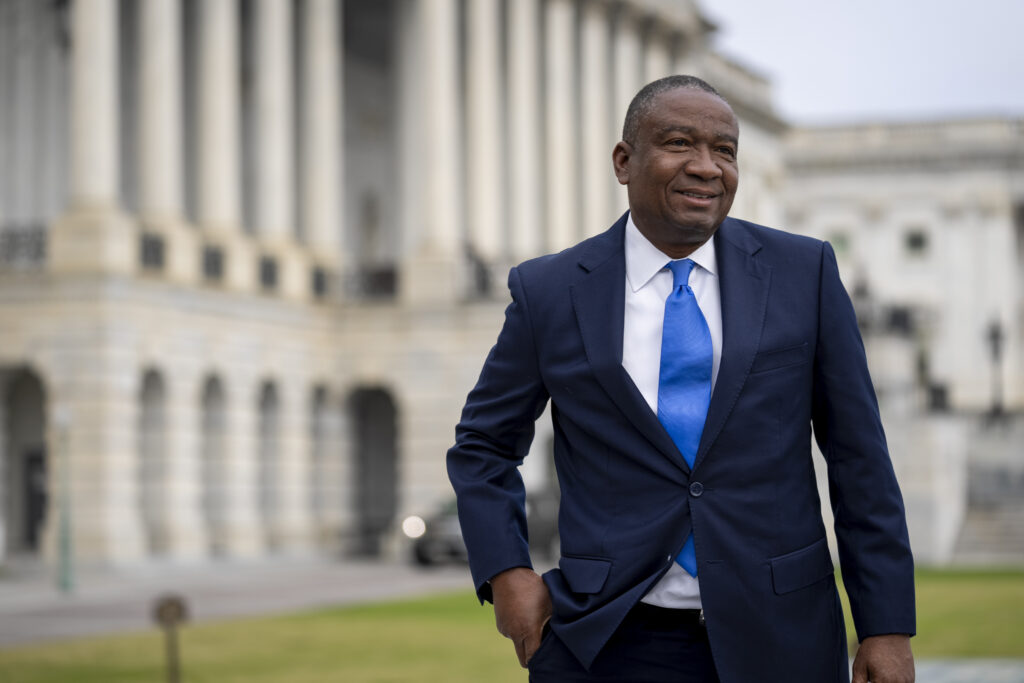The Supreme Court on Wednesday will hear arguments in a case that could gut the Voting Rights Act by barring states from considering the racial makeup of voting populations when drawing district lines — an outcome that stands to change the course of next year’s midterm elections.
In adopting that approach, the justices could upend decades of court decisions holding that states may — and sometimes must — use race-conscious redistricting to protect the voting power of minorities.
Some conservatives argue that any consideration of race in drawing district lines is cynical, discriminatory and unconstitutional. Advocates for minority voters warn a “colorblind” interpretation of the Voting Rights Act would erode Black, brown and Asian representation in American politics and kick off another round of redistricting amid an already chaotic cycle of mid-decade redraws ahead of 2026.
President Donald Trump has been pushing red states across the country to redesign their congressional maps as Democrats fight to retake control over the House, leading California to counter with its own push that voters will decide on next month. Yet another potential redistricting resulting from this court case would be a political bonanza for Republicans in next year’s congressional elections, according to an analysis from two liberal groups.
The case, Louisiana v. Callais, is the culmination of a long-running battle in the state over Black voters’ representation in Congress. The Supreme Court heard the case in March, but the justices failed to issue a ruling and made the unusual decision to hear it again. And this time, the high court has signaled its particular interest in the argument that a core tenet of the Voting Rights Act may violate the Constitution.
Under Chief Justice John Roberts, the court has already curtailed many of the protections within the 60-year-old civil rights law. Weakening it further has long been a goal of some Republican litigators, who have argued it gives Democrats an unfair partisan advantage.
“It is time for the Supreme Court to finally eliminate this government-mandated business of divvying Americans up by race through redistricting and reaffirm our colorblind Constitution’s guarantee of equal protection under the law,” Adam Kincaid, president of the National Republican Redistricting Trust, said in a statement. His group has previously been involved in similar cases but isn’t representing any party in this one.
If the court again restricts the law in Callais, advocates warn of diminished political power of minority voters in federal, state and local elections.
The case “could have profound implications for the Voting Rights Act and fair representation for voters nationwide,” said Sophia Lin Lakin, the director of the ACLU’s Voting Rights Project and one of the attorneys defending the Louisiana map being challenged in the case. “The stakes are incredibly high: The outcome of the case will not only determine the next steps for Louisiana’s congressional map, but may also shape the future of redistricting cases nationwide and forecast the resilience of our nation’s democratic values.”
A landmark law meets a constitutional challenge
The case centers on Section 2 of the Voting Rights Act, the key provision of the law that broadly prohibits discrimination in voting practices on the basis of race or creed. For decades, Section 2 has been understood to require some legislative districts where minority voters have a “meaningful” opportunity to elect their preferred candidates. In practice, that often means districts where racial minorities make up at least half the population.
Supporters say the requirement of what are called majority-minority districts prevents state legislatures from diluting minorities’ voting power by either “cracking” communities — scattering minority voters into numerous white-dominated (and frequently Republican-dominated) districts — or “packing” districts by trying to fit as many minority voters into as few districts as possible so they end up underrepresented in the House or state legislature.
But some conservatives say any race-conscious redistricting violates both the 14th Amendment’s equal protection clause, which generally prohibits the government from discriminating on the basis of race, and the 15th Amendment, which says the right to vote cannot be abridged on account of race. They also say the practice relies on outdated stereotypes about the political preferences of minority voters.
“Perhaps in decades past, the Court could assume that Section 2 was ‘remediating specific, identified instances of past discrimination’ in redistricting,” a coalition of Republican-led states wrote in a legal brief. “No longer. This unconstrained, opaque, and odious use of race ‘cannot extend’ any further.”
The conservative majority on the Supreme Court is often skeptical of any race-based decision-making by government actors, and the court has increasingly interpreted the Constitution in other contexts to mandate strict colorblindness. The conservative justices may now be poised to extend that approach to voting rights, too.
A fight in Louisiana
Some states have complained they’re in a no-win position regarding race and redistricting. If they don’t use racial voting data to draw district lines that protect minority voters, they will be sued under the Voting Rights Act. If they rely too heavily on race, they may run afoul of the Constitution.
That conundrum has played out in Louisiana, where the GOP-controlled Legislature drew only one of the state’s six congressional districts to be majority Black after the 2020 census, despite roughly one-third of the state’s population being Black.
A group of Black voters sued, and a district court judge found in 2022 that the map likely violated Section 2 of Voting Rights Act by diluting the power of Black voters.
After ping-ponging through the federal court system, including multiple rulings from the Supreme Court that avoided the merits of the case, the lower court order remained. The Legislature ultimately complied, drawing a new congressional map in 2024 with a second majority Black district that snaked across the state. That map resulted in the state electing two Democrats to the House for the first time in about 20 years, and two Black representatives for the first time since the 1990s.
But almost immediately, a group of self-identified non-Black voters brought a new lawsuit. They, too, alleged racial discrimination. A divided panel of federal judges ruled in favor of the new challengers, finding that race played a primary role in drawing the lines and that the new map unconstitutionally discriminated against the non-Black voters.
The appeal of that ruling is now at the Supreme Court.
Political actors pile in
Nearly everyone agrees the case will have ramifications beyond Louisiana, especially in light of the high court’s terse August order refocusing the case on the constitutional issues.
Just a few weeks after that order, Louisiana switched sides in the case. Originally, the state had defended its map containing two majority-Black districts. But now, the state is no longer defending the map and in fact is urging the Supreme Court to overturn the long-established understanding of Section 2.
“Race-based redistricting is fundamentally contrary to our Constitution,” Louisiana Attorney General Liz Murrill, a Republican, and other state attorneys wrote. “Louisiana’s experience suggests that [past precedent] cannot be reformed and should be overruled.”
Much of the conservative legal world — from Trump’s Department of Justice to a string of GOP-led states and conservative advocacy organizations — quickly piled on, arguing the “results”-based test of election outcomes, which has guided Voting Rights Act enforcement for decades, is no longer tenable.
“In short, this Court’s Section 2 jurisprudence should account for the fact that, today, a State’s failure to create a compact majority-minority district, even where demographically possible, is far more likely to reflect political motives than racial ones,” Trump’s Justice Department wrote. “Too often, Section 2 is deployed as a form of electoral race-based affirmative action to undo a State’s constitutional pursuit of political ends. That misuse of Section 2 is unconstitutional.”
Arguments like the Justice Department’s, critics argue, would effectively make the Voting Rights Act colorblind: Outcomes that are not facially discriminatory but produce discriminatory results would now be legal.
In the realm of redistricting, they say, that would lead to current majority-minority districts being torn apart, leaving Black, Latino and Asian voters underrepresented in Congress.
“Without the protections articulated in Gingles, the advances made will collapse to the pre-VRA status quo,” read a friend of the court brief from members of the Congressional Black Caucus, referencing a 1980s Supreme Court ruling that led to the proliferation of majority-minority districts. “An adverse ruling here would embolden states to crack and pack minority voters and unravel decades of existing remedies under the guise of midcycle redistricting.”
Will it come in time for 2026?
Wednesday’s oral arguments come amid one of the most frantic instances of mid-decade redistricting in recent memory. At the urging of Trump, Texas redrew its congressional map earlier this year, making five seats more favorable to the GOP. That kicked off an arm’s race across the country: Californians this November are voting on a retaliatory gerrymander in response to Texas, while a handful of other states are either considering or taking steps to redraw their lines, often under pressure from Washington.
Democrats are already sounding the alarm on the impact that the Supreme Court’s decision could have on next year’s midterms, warning Republicans could draw as many as 19 new House seats in states they control and, in the process, could oust nearly a third of the Congressional Black Caucus.
But it’s unclear if the Supreme Court will rule quickly enough for state legislatures to act before primary contests, which start as early as March in some states.

The stakes of the case “are only heightened by the backdrop of this national gerrymandering crisis,” former Democratic Attorney General Eric Holder, who heads Democrats’ main redistricting arm, told reporters in a press call ahead of the hearing.
A ruling from the high court neutering the VRA could also foreclose one of the last remaining avenues for challenging redistricting in federal court. The 2019 Rucho v. Common Cause decision from the high court found that the federal judiciary has no role policing partisan gerrymandering.
Chipping away at the VRA — with one exception
The Roberts court has broadly been hostile to the Voting Rights Act, and has significantly limited the scope of the law over the past decade and a half, leaving Section 2 enforcement as effectively the last remaining pillar of the law standing.
Most notably, the Supreme Court in 2013 struck down the part of the VRA that determined which jurisdictions had a history of discrimination and needed to get federal permission before changing their voting laws.
And Section 2 has gradually been weathered away, too. A 2018 decision in Abbott v. Perez effectively granted legislatures the presumption of good faith when dealing with Section 2 claims, while a 2021 court ruling in Brnovich v. Democratic National Committee saw a conservative majority set up a series of restrictive “guideposts” to assess whether a law was truly discriminatory or not.
The VRA dodged a bullet two years ago in Allen v. Milligan, where Roberts and Justice Brett Kavanaugh joined the court’s liberals in a surprise decision that found that Alabama’s congressional map likely violated the Voting Rights Act. But advocates argue now that the posture of the court heading into Callais suggests that another serious blow is on its way.
At least one conservative justice, Clarence Thomas, has made clear he believes the current Section 2 legal regime should go.
“For over three decades, I have called for ‘a systematic reassessment of our interpretation of Section 2,’” he wrote in June, dissenting from the decision to rehear the Louisiana case and arguing it should have been decided immediately. “I am hopeful that this Court will soon realize that the conflict its Section 2 jurisprudence has sown with the Constitution is too severe to ignore.”
Read the full article here
